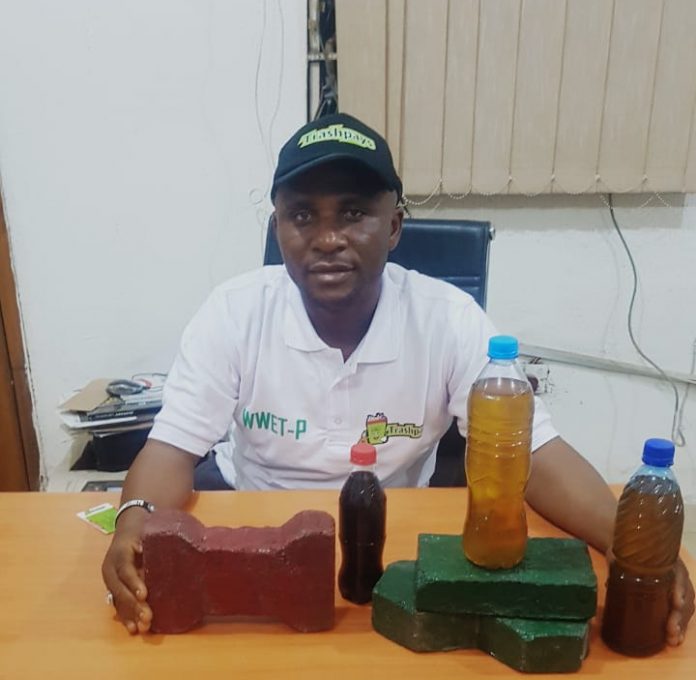Trashpays Innovation on Converting Plastic Waste to Fuel and Building Materials
By Oyetunji Aisha
TECHDIGEST – Waste production and management has been a very big environmental issue over the last couple of decades in many parts of the world, especially in developing nations like Africa with no specific or imposed law regarding waste generation and disposal, emanating from the daily consumption and activities of the citizens.
Dumping of waste in unseemly places such as open incinerators, drainages, rivers, streams, open spaces and sensitive places have become common and regular occurrences due to the lack of knowledge of how hazardous it can be to personal health and the immediate environment.
Waste that are dumped indiscriminately often times pollutes the environment and air with unpleasant smells with air borne diseases that threaten public health. This waste causes blockage of water bodies and also provides harmful materials for aquatic animals by reducing their lifespan. The Global Sustainable Development Goals has emphasized on good health and well-being, clean water and sanitation, climate action, life below water, and life on land. These goals are impacted by waste we generate from our households, marketplace, industries and cities.
Waste management have created an avenue for researchers and innovator to continue to develop models and initiatives to mitigate and provide alternative use for generated waste items. These reasons and many more brought about the initiative behind the formation of Trashpays, an online platform which enables people to trade their waste/ trash items to earn money while recycling them into renewable good and most importantly help maintain an hygienic environment by removing waste and trash off the streets.
Trashpays Services since her inception has employed the services of experts to conduct researches on waste and how best to convert, reuse, re-modify, recycle and reduce waste items.
In an interview with one of the researchers for Trashpays Services, Mr. Chibuzor, he explained in details why he became Interested in transforming waste to wealth, he felt it was another way to improve the state of the economy and change our sorry tale of constant recession by creating means of livelihood and job opportunities for our steaming youth population. He elaborated on possible transformation capacity of items we use in our households, marketplaces and cities to reusable and recycled raw materials.
The knowledge of waste management and recycling is a gold mine most people are yet to discover.
Read Also:
For these reasons, Trashpays decided to contribute their quota by organising many training and workshop sessions in collaboration with other health and environmental concerned agencies to educate people on how to transform their trash into wealth, one of the biggest training session was held sometime last year in Abuja which was term WWETP (Waste to Wealth Entrepreneurship Programme), the training was met with a huge success as the participants were able to learn a lot of useful tips from experts in various categories of waste transformation.
The Trashpays Services had also assured that there would be many more of those workshops and training sessions in the near future with the aim to exposing many youths as possible to the usefulness of trash so they can become self reliant and sufficient to better their lives and of those around them. Mr. Chibuzor affirmed that Trashpays Services are strategizing on taking this workshops and training to all the six Geo-political Zones of the Federation, with open collaboration with State Government, Federal Government, International Partners and Private Enterprise.
Mr chibuzor gave a very good and solid example of how he usually extract PMS (Premium Motor Spirit) petrol, diesel and even make interlocking blocks from the ruminate wastes of plastic water bottles and nylons which are mostly found lying carelessly about, this is done by extracting the liquid of the products. He went further to enlist more materials that can be product from these waste items such as plastic pipes, roofing sheets and carpets.
He also told the story of how he carried out an experiment in the year 2015 by burying a plastic bottle and left it for years before going back to dig it up in the year 2020 and he found the bottle still intact and undecomposed and that fired his desire and need to research more on plastic waste and how to recycle them for better uses. He said, many other generated household and marketplace waste materials can also be recycled. Stating that we can convert organic waste to biomass that can be used for cooking gas and even generate electricity to power our homes. He went further to say, condemn engine oil can also be recycled and used again. He stated that these training can be exhibited by Trashpays Services, and the company is looking forward to create a physical hub where technical and innovation skills can be demonstrated and transferred.
In his review on his research, he came to the conclusion that in the next few decades, “plastic and nylon wastes” would become a resource that countries would transform to provide an alternative source for livelihood and innovations. These forms of innovations in the future would contribute to the nation’s powerful economic tool if channeled and used rightly to their advantage.




















